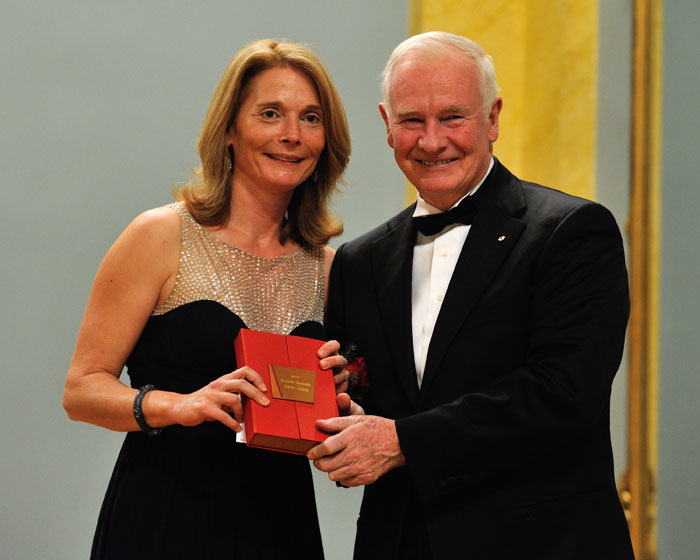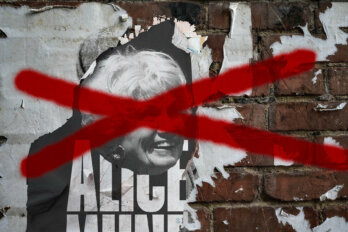
Bios of the author and screenwriter Susin Nielsen typically begin with some variation on this sentence, cribbed from her website: “Susin got her start feeding cast and crew muffins and bologna sandwiches on the award-winning television series, Degrassi Junior High.” What they omit is that prior to her time on Degrassi, she was an assistant on what she describes as a “horrible, horrible, schlocky, B, B, B, straight-to-video, slasher, booby flick called either Night Shift or Graveyard Shift.”
Nielsen, though, didn’t cater for long. She started writing for Degrassi during the show’s second season, and has since written for several other television series. She has also published three children’s books and three young adult novels. In November, her latest book, The Reluctant Journal of Henry K. Larsen, was awarded the Governor General’s Literary Award for English-language children’s literature. Praised by the jury for addressing “the effects of bullying in a realistic, compelling and compassionate way,” and “exemplifying the adage ‘There are two sides to every story,’” the book tells the story of thirteen-year-old Henry as he and his family try to build some semblance of a life after a school shooting—one in which his older brother is seemingly the villain. Nielsen is now at work on her fourth YA novel. She lives in Vancouver.
How did the idea for The Reluctant Journal of Henry K. Larsen arise?
I’d been reading Wally Lamb’s The Hour I First Believed, and he sets one of his characters in the very real circumstance of Columbine. He mentions that one of the killers had an older brother and that just really stopped me in my tracks. I realized I had never thought about the surviving sibling in a situation like that, and what it would be like for them.
Where did you go from there?
I started writing random bits that would occur to me—just Henry’s thoughts on different things—as a way to get his voice. It was a building block process.
Was this book harder to write than your previous two YA novels? Did writing the story as a journal present any particular challenges?
I get rose-coloured glasses after they’re done, but this one was probably the most challenging. My first two books were also written in the first person, but I could talk about things as they were happening. You can’t do that in a journal. You have to write [largely in the past tense] and, yet, keep the momentum going and keep it well-paced. Also, I was dealing with a much darker subject than I’ve dealt with before, and still imbuing it with a lot of humour.
Why young adult fiction? Why focus on the teenage experience?
It’s just such a great time of life—an egocentric time with a lot of first experiences. On the one hand—and I don’t say this with any disrespect—you think you know it all, you think you’re much more mature than you really are. But, of course, there’s a big part of you that’s still a child. And the world is opening up so rapidly, especially these days.
So how do you inhabit that world?
Some of it’s intuitive. I honestly sometimes think that part of my brain just stopped developing at around that age. On the good days, your characters really take over and open up whole aspects of the story. I’m not trying to make it sound highfalutin or anything, but that part of the process will always remain a mystery.
I guess that’s why you’re a writer and not selling insurance.
Well, I’d be hopeless at anything else.
Do you ever have trouble with writer’s block? How do you overcome it?
If it’s a writing day, I force myself to write—even if I don’t know where I’m going with the story, even if I have no good ideas. Maybe it’s just a page, and maybe it’s a shitty page that I’m going to throw out the next day, but at least I can say I wrote something. The TV work is very useful for this because you can’t afford to have writer’s block in television.
Did you take anything else with you from TV?
Yes, a sense of pace. When you write TV, any flab is usually gone by the time the story goes to camera. I also think I tend to write reasonably snappy dialogue and that definitely comes from my TV work.
Have you always wanted to write?
After [my first YA novel] Word Nerd was published, I was out in our garage and I found the first diary I ever kept. I think I was eleven. The very first paragraph went “This is the first day I’ve really written in a diary. The reason I am is because I love writing stories and, if I do grow up to be a famous writer and later die and they want to get a story of my life, I guess I should keep a diary.” That’s 100 percent verbatim.
Do you feel obligated to do morally instructive work, as a writer for young adults?
I’m a storyteller. I never set out to [write], “And the lesson I’m going to be teaching the children is….” I never do that. At the same time, I think my books have a lot of humanity. They’re left with a sense of hope. All my protagonists are decent human beings, however flawed. They work from a place of caring for the other people in their lives. And I don’t think I’m writing stuff that kids in my target age group can’t handle.
Did you have to do much research for the themes in your book? How did you learn so much about wrestling, for example?
I watched it on TV. I ordered this big, glossy book WWE Encyclopedia: The Definitive Guide to World Wrestling Entertainment. I looked up all the wrestling moves online, and I read Bret Hart’s autobiography Hitman. He’s the one who talked about “babyfaces” and “heels” and, when I read that, I thought “Oh my god, there’s my perfect little metaphor.”
Finally, what does it mean to win a Governor General’s Literary Award?
I’m incredibly honoured. The recognition from the jury was very moving. I feel like I’m still establishing myself, so I’m hoping it will help solidify my reputation as somebody who writes quality young adult books. And I hope it means that my book will reach a wider readership in Canada.
This interview has been condensed and edited for publication.




